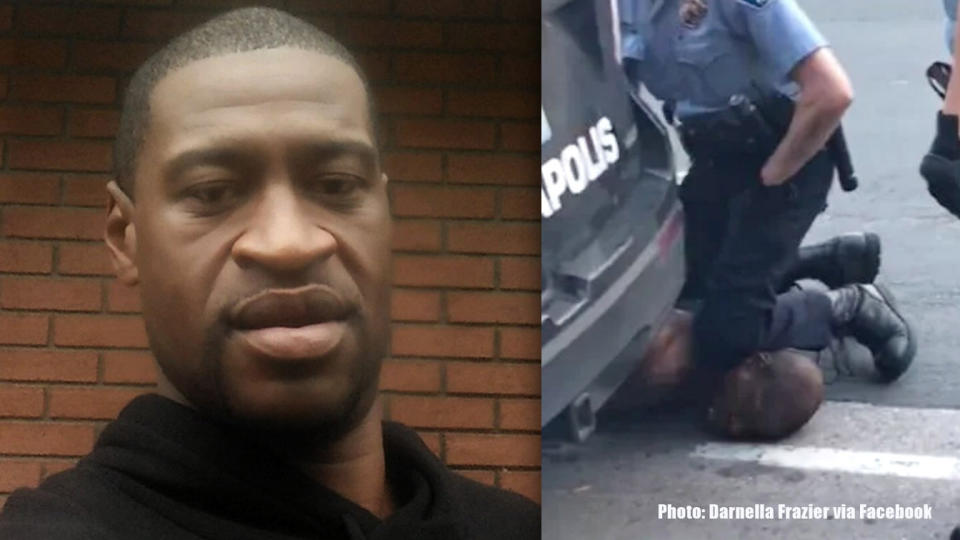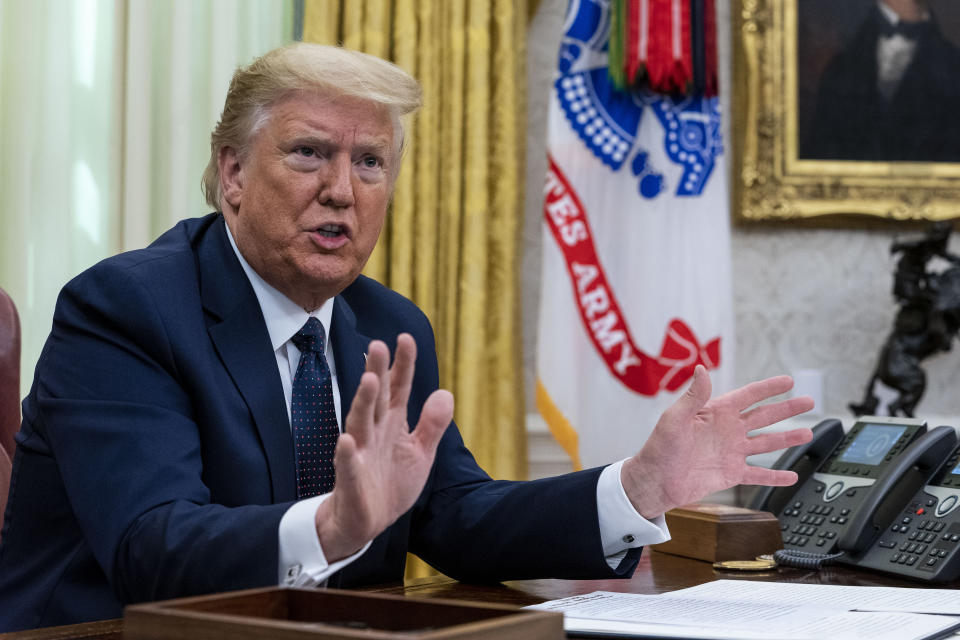George Floyd death puts spotlight on 'warrior training' for police
The death of George Floyd in police custody in Minneapolis is the latest in a series of deaths of black men at the hands of white law enforcement officers, notable because of the graphic video of an officer kneeling on his neck as he pleaded for breath, and the violent protests it sparked. Like other cases, it has called attention to police training, protocols and discipline — including the controversial practice of imbuing police cadets with a readiness to kill, known as “warrior training.”
Derek Chauvin, the white officer seen in the video, had 18 prior complaints filed against him, according to the Minneapolis Police Department. The maneuver he employed had been taught until 2016 at Hennepin Technical College, which trains roughly half of Minnesota’s police officers, the Minneapolis Star Tribune reported.
Mylan Masson, former director of the education center at the college, expressed shock at seeing Chauvin use the restraint technique for nearly eight minutes while Floyd pleads, “I can’t breathe ... please stop.”
“Once the [officer] is in control, then you release,” Masson told the Star Tribune. “That’s what use of force is: You use it till the threat has stopped.”

Police had been called to the scene by a shopkeeper who said a man had tried to pass a counterfeit bill. Floyd, who was not armed, was handcuffed and prone on the ground during the video.
While the chokehold has been banned in most of Minnesota, it was still allowed in Minneapolis.
Floyd’s death has refocused attention on “warrior-style” police training, which Minneapolis Mayor Jacob Frey banned last year, and which may help explain how yet another unarmed African-American suspect was killed after being detained.
Citing the 2016 death of Philando Castile, a 32-year-old African-American man who was shot and killed by a police officer during a traffic stop with his girlfriend and her daughter in the car with him, Frey banned police from using “fear-based training” in April 2019.
“Fear-based trainings violate the values at the very heart of community policing,” Frey said. “When you’re conditioned to believe that every person encountered poses a threat to your existence, you simply cannot be expected to build out meaningful relationships with those same people.”
Frey specifically mentioned the classes taught to police in Minnesota and the rest of the country by Dave Grossman, a retired lieutenant colonel with the U.S. Army’s 82nd Airborne. Grossman is the author of “On Killing: The Psychological Cost of Learning to Kill in War and Society,” a book that promotes the training of a theory he calls “killology” that promotes the mindset needed to take human life.
While many in Minneapolis applauded Frey’s decision to stop the city-funded classes, many members of the police force did not.
Minneapolis Police Union president Lt. Bob Kroll said the ban was illegal. “It’s not about killing, it’s about surviving,” Kroll said. He also announced that the union would offer the training to officers during off-duty hours.
Kroll, a supporter of President Trump, spoke at a Trump rally in Minneapolis wearing a “Cops for Trump” T-shirt.
“The Obama administration and the handcuffing and oppression of police was despicable,” Kroll told the audience. “The first thing President Trump did when he took office was turn that around. ... He decided to start let cops do their job, put the handcuffs on the criminals instead of on us.”
But not everyone in law enforcement agrees that Frey was wrong to eliminate warrior-style training by the police academy.
“The local union chief in Minneapolis has had a long history of antagonism to the community, and I’m saying that very lightly,” Vanita Gupta, president and CEO of the Leadership Conference on Civil and Human Rights and former chief of the Justice Department civil rights division, told Yahoo News’ “Skullduggery” podcast. “There have been much stronger accusations about his own affiliations, but you know, when the mayor a year ago tried to abolish a kind of training, a warrior-type training in Minneapolis, the union chief went ahead in defiance and hired and spent money to reengage trainers to kind of promote this warrior thinking.”
Retired Minneapolis Police Sgt. Michael Quinn, a former trainer at the Minneapolis Police Academy, told local NBC News affiliate KARE that courses like “killology” inculcated a dangerous mindset.
“You end up with this hypervigilant mode all of the time,” Quinn said. “If you fear for your life on every little startling moment in this job, you’re in the wrong job.”
Trump has long promoted an aggressive response from police toward suspects in their custody.
“When you guys put somebody in the car and you’re protecting their head, you know, the way you put their hand over?” Trump said in a 2017 speech in Long Island, N.Y. “Like, don’t hit their head, and they just killed somebody — don’t hit their head. I said, you can take the hand away, OK?”

A month later, Trump overturned a 2015 executive order signed by Barack Obama that ended the practice of supplying police departments with surplus military equipment — including armored vehicles, grenade launchers and high-caliber weapons. The ban came following an outcry over the “militarized” police response to violent protests over the killing of Michael Brown, an African-American teenager, in Ferguson, Mo.
“We’ve seen how militarized gear can sometimes give people a feeling like there’s an occupying force as opposed to a force that’s part of the community that’s protecting them and serving them,” Obama said. “It can alienate and intimidate local residents and send the wrong message.”
In explaining Trump’s decision to overturn the ban, then-Attorney General Jeff Sessions said the priority was in protecting the lives of law enforcement.
“The executive order the President will sign today will ensure that you can get the lifesaving gear that you need to do your job and send a strong message that we will not allow criminal activity and lawlessness to become a new normal,” Sessions said in a speech to the Fraternal Order of Police.
It’s not yet known whether Chauvin, who was arrested and charged with third-degree murder on Friday, had attended any “warrior-style” classes during his 19 years with the MPD. In the video of the encounter with Floyd, he appears calm and unemotional.
A cornerstone of Grossman’s “killology” training is the frame of mind required to do the job.
“Are you emotionally, spiritually, psychologically prepared to snuff out a human life in defense of innocent lives?” Grossman asked officers who attended one of his classes in Ohio. “If you can’t make that decision, you need to find another job.”
_____
Read more:




